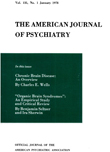LONG-TERM PROGNOSIS IN MENTAL ILLNESS
Abstract
All of the 141 patients admitted in 1921 to Westborough State Hospital soon after study at the Boston Psychopathic Hospital were investigated 30 years later. Only 7% of the group could not be traced.
The study included age, diagnoses, time spent in hospital, condition on discharge, community adjustment, age at death, and cause of death.
In this cross-section sample, 26% of all admissions traced were recovered before death or when seen after 30 years. It was noteworthy that the dementia præcox patients, constituting 42% of the group, accounted for 39% of the surviving patients in the community and 35% of all recovered patients. Where no significant diagnostic disagreement occurred throughout successive hospitalizations, only 13% of dementia præcox patients were recovered. Where the last hospital diagnosis was accepted as valid, 23% of dementia præcox patients were recovered at death or when seen after 30 years and an additional 6% were much improved.
Access content
To read the fulltext, please use one of the options below to sign in or purchase access.- Personal login
- Institutional Login
- Sign in via OpenAthens
- Register for access
-
Please login/register if you wish to pair your device and check access availability.
Not a subscriber?
PsychiatryOnline subscription options offer access to the DSM-5 library, books, journals, CME, and patient resources. This all-in-one virtual library provides psychiatrists and mental health professionals with key resources for diagnosis, treatment, research, and professional development.
Need more help? PsychiatryOnline Customer Service may be reached by emailing [email protected] or by calling 800-368-5777 (in the U.S.) or 703-907-7322 (outside the U.S.).



